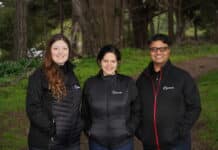The two-day OSScamp Delhi September 2009 came to a successful closure on September 6th.Scheduled at NSIT (Dwarka Campus), Delhi for September 5th-6th, The two day event saw 225 open source enthusiasts come together and discuss open source technologies over 20 sessions and many social sandboxes. The topics under discussion were many including open web standards, Internet, ruby on rails, grails, flash, console programming, architectures, flex, unconferences, open source and Scala.
The first day began with Lalit Shandilya taking up the mic and welcoming every camper with a ‘jaadu ki jhappi’, what followed next was the announcement of Sachin Khosla’s open source marriage. With Sachin doing the monkey dance, we were all set to begin the day. The first session was a brief introduction to open source by me. I merely discussed the open source definition and introduced the concept of unconferences. This led to an interesting discussion between campers on open source licensing and creative commons.
Nirat Bhatnagar then took the opportunity to introduce Goodbeats – a technology-led social innovation. In his session he discussed ways how open source empowers people and facilitates change. He highlighted various issues that have been answered through open source and open standards and some issues that can use some help. The next session was Swagat Sen, who discussed open source education model. Swagat talked about ways open source can help with education system we have in India How we can use the ever-improving open source technologies, social networks to make education an engaging process. This session was followed by Lalit Shandilya’s talk on ‘Your Employability’ – a walk through on how open source can empowers your career. He emphasized on building skill sets and relationships, sharing of opinions and ideas and developing a holistic profile for yourself.
Next Aman Aggarwal and his colleague led an introductory session to Grails. The fun and interactive session began with a question asked by Aman “How many of you think that Java is crap?” Well, you should try grails. They talked a bit about grails and then jumped into a live demo of working with grails. Within a talk of half an hour, they developed a basic address book application in grails. Another highlight was scaffolding in grails. [Grails is an open source web application framework which leverages the Groovy programming language (which is in turn based on the Java platform). It is intended to be a high-productivity framework by following the “coding by convention” paradigm, providing a stand-alone development environment and hiding much of the configuration detail from the developer. |source:wikipedia]
The next session was by Gaurav Chauhan who gave a demo of how grails can be used to build an application like twitter. He shared the presentation given by Graeme Rocher, the project manager of Grails. The rather exhaustive demo had to be cut short for a scheduled webinar with Bryan House, Director (Marketing) of Acquia. However the webinar had to be canceled due to rigid network security guidelines by the NSIT administration.
We then moved on to a session on ‘Indie Game Development using FOSS Tools’. The awesome session by Yadu was an animated discussion on the game development life cycle He later on focused on the OGRE 3D engine and demoed videos of Ogre 3D and Open GL capabilities. [OGRE (Object-Oriented Graphics Rendering Engine) is a scene-oriented, flexible 3D rendering engine (as opposed to a game engine) written in C++ designed to make it easier and intuitive for developers to produce applications utilizing hardware-accelerated 3D graphics. The class library abstracts the details of using the underlying system libraries like Direct3D and OpenGL and provides an interface based on world objects and other high level classes. |source: wikipedia]
After Yadu’s talk, we closed for the day. Day 1 saw a huge turnout and some good sessions. Day 2 had even more in store for us.
Day 2 started with a discussion on ‘Building Key Based Authentication Systems with Phing’ by Tarun Seth. Tarun showcased how Phing can be used for authentication and security.
The next session was on Flex 3 by Romil Mittal. The talk was an overview on Flex Framework and discussed issues with the RIA Framework’s adoption and the future road-map for Flex. Romil, who was representing Adobe, promised the campers about Adobe’s commitment to open source and continued to talk about Flex and Blaze DS. After Romil’s session, the day progressed to a session on ‘Data Migration to MySQL’ by Anil Yadav. Anil led a rather technical talk on migrating databases from proprietary databases to MySQL Next was again an Adobe session on Blaze DS by Ajay Bansal. Campers were enjoying pizzas while participating at this session – something that can only happen at an unconference.
Next was a talk on ‘Rules with Drools’ by Saket & Gaurav who said that the Java professionals are hated, because they are the best. [Drools is a business rule management system (BRMS) with a forward chaining inference based rules engine, more correctly known as a production rule system, using an enhanced implementation of the Rete algorithm. | source: wikipedia] the focus of the talk was how working with Drools facilitates decision making and how it is simpler than working with rules in Java
Next, Ankur Banerjee led a discussion on open source licensing, especially creative commons. He went to explain all possible combinations of the creative commons licensing and then explained the 11 possible combinations.
Narendra Sisodiya, next, did a demo of his FOSS project – Project Eduvid. [Eduvid is a white-boarding and presentation tool, an e-learning platform. Eduvid create automated slideshow based on presentations timings which are recorded automatically in browser. | source: eduvid.techfandu.org]
Next was the interesting talk on Scala by Vikas Hazrati and Meetu Maltiar. [Scala is a multi-paradigm programming language designed to integrate features of object-oriented programming and functional programming. The name Scala stands for “scalable language”, signifying that it is designed to grow with the demands of its users. | source:wikipedia.com] Vikas & Meetu went on to explain how Scala blends functional programming with OOPs results in a language that is easier and simpler to write applications without compromising on efficiency and functionality.
After the talk on Scala, Vishveshwar Jatain led a talk on ‘6 FOSS Tools and Web Services that you might not have heard of’. In his talk, Vishveshwar talked about tools that are very useful and popular, yet not mainstream yet. He discussed about Paint .NET, Wakoopa, KeePass, Diigo, Retaggr, and NetSetMan.
A technical talk on implementing ‘Zend Lucene Search’ in your PHP projects by Ankur Aeren followed Vishveshwar’s talk. Ankur emphasized on how Lucene is a superior search library over other libraries and walked people through setting up Lucene search in their Zend PHP projects.
Next was an open source quiz run by Ankur Banerjee. Digimantra.com and Linux For You happily donated giveaways for the quiz. Mohak Prince also brought together some Mozilla Goodies to give away. Yugal was the happy winner of a .IN domain name sponsored by Digimantra for the quiz.
The last session for the day was a hands on Jquery by Manu Goel. It was an open discussion on best practices and coding standards around Jquery Manu discussed at length how not to screw up with Jquery
We are very happy with the huge turnout at the camp. It is also a positive sign that any companies find OSScamps as a reliable platform to talk about open source. There is a lot of tweaking required and a lot of efforts will be required to maintain the quality of the event. I am sure the community is up to it.
We are thankful to our sponsors OSSCube and Acquia for helping us in realizing the dream for OSScamp Delhi September 2009. Thanks also to our media partners – Linux For You and Blogadda for helping us put with the promotion and exposure of the event. A special note for all the volunteers who played a crucial role in the successful organization of the camp – especially Yadu who designed all the assets for the camp, Mohak who planned out the logistics, Priyanka, Rony, Sachin, Ankur, Lalit and Narendra who held together the event during the two days.
Images from the camp have been uploaded on the community’s Flickr group, Videos on the Vimeo Channel and presentations on Slide Share.
We are also glad to announce that Chandigarh will see its first OSScamp on October 24th 2009, being organized by students of Chitkara University and the open source community in Punjab. Head over to the Chandigarh camp page for details and registrations and also join the community mailing list.













































































